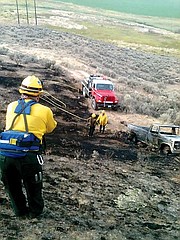Volunteers needed at fire departments
Royal Register Editor | Hagadone News Network | UPDATED 13 years AGO
ROYAL CITY – The ideal number of firefighters for a structure fire is 20, but there were only 10 at the last such fire in Royal City.
And Grant County Fire Districts Nos. 10-11 Chief Brian Evans is concerned that some day the responders will be fewer.
There are only 19 volunteers now at District 10 and 14 at District 11. Beverly station has six, Mar-Don station three, Royal Camp station one and Smyrna station zero.
“They can't all respond at the same time. They have family commitments and jobs,” Evans said.
Royal Camp and Smyrna station have been decertified by the state for lack of personnel. That means property owners normally served by those stations pay higher insurance premiums than others. That can happen to other districts.
According to Evans, the need for volunteers is county-wide. Every fire district could use more.
People interested in becoming volunteers should call, or stop by, their local fire department for more information.
They can also visit the Washington State fire recruiting website at HYPERLINK "http://www.justbethere.info/"www.justbethere.info
According to Evans, there is a multitude of reasons for volunteering. All of them relate to community service
Evans took his turn as a volunteer in Coulee City from the ages of 18-30. His father was a volunteer.
“I grew up tagging along with the firefighters from the time I was five” he said.
Rush Hersh, the second paid firefighter – EMT and mechanic - for Districts 10-11, was a volunteer at Ephrata. He remembers the elation he felt when his actions saved a home from a wild land fire.
Another moment that brought satisfaction to Hersh was the time he applied CPR to a Royal City emergency medical victim during an ambulance ride to Moses Lake and helped re-start her heart.
“You get to help people,” Evans said. “You help your neighbor in his or her time of need.”
Farm manager Lynn Lindsey has volunteered at five different departments since 1972. He had four opportunities to drop out while being transferred by his employer but didn't.
“It kind of gets into your system and your blood,” he said. “It's the thank yous that keep you going.”
Evans noted most of the reasons volunteers leave are understandable. They are aging. In some cases they are moving to new communities. Without new volunteers to fill their shoes, there will not be anyone to respond when the citizens call for help.
“When you ask some people to volunteer, they say, 'I pay my taxes for fire protection,'” Evans added. “They don't understand the taxes, and the equipment they buy, are no good without volunteers. Contrary to popular belief, volunteers do not receive a wage when they respond. It is not a part time job. Many do not receive any compensation for responding, others receive a small reimbursement for their time and expense, approximately $5 or less per call.”
Another reason some people won't volunteer is that they are too busy. So are current volunteers, Evans said. That's why a large pool is needed.
Some people won't volunteer because they believe firefighting is dangerous. Yes it is, Evans said, but less so than driving a car.
“More than 30,000 people died in traffic accidents in 2011. Less than 100 firefighters die every year in the line of duty,” Evans said.
And measures are taken to make firefighting as safe as possible. All firefighters are equipped against burn and smoke inhalation, and no one is sent into a dangerous situation haphazardly.
“The command officer inspects the situation, looking for propane tanks, downed electrical wires, and assesses the incident before sending firefighters in,” Evans said.
The most important safety feature is continual training. All firefighters are expected to attend a minimum of 10 two-hour training meetings per year, and 10 percent of emergency calls for the station to which they are assigned.
“I can almost guarantee that most people watch more TV per week than the monthly time commitment to volunteer,” Evans said.
The ultimate reason to volunteer, Evans said, is so that there is maximum protection against fires. In 1970, people had 18 minutes to get out of a burning house. Because of changes in materials, that time is down to three minutes. That means houses are burning faster.
“That's people's homes, belongings, papers, pictures, memories, everything they've worked for going up in flames,” Evans said.



